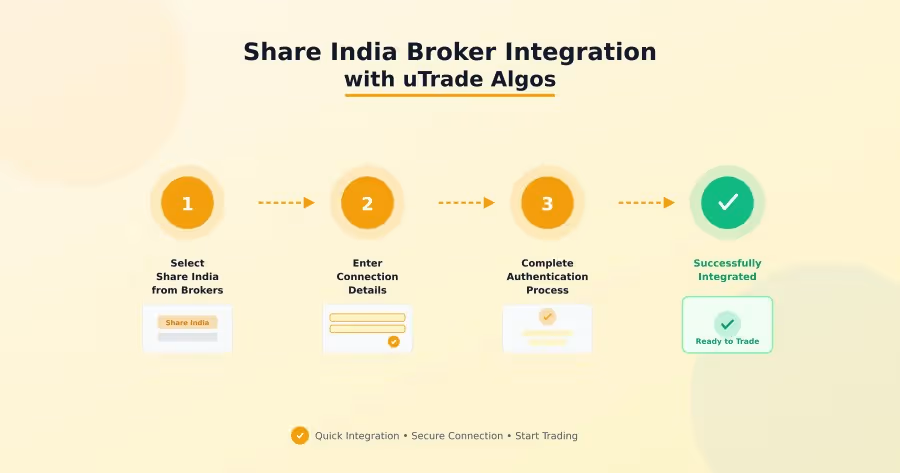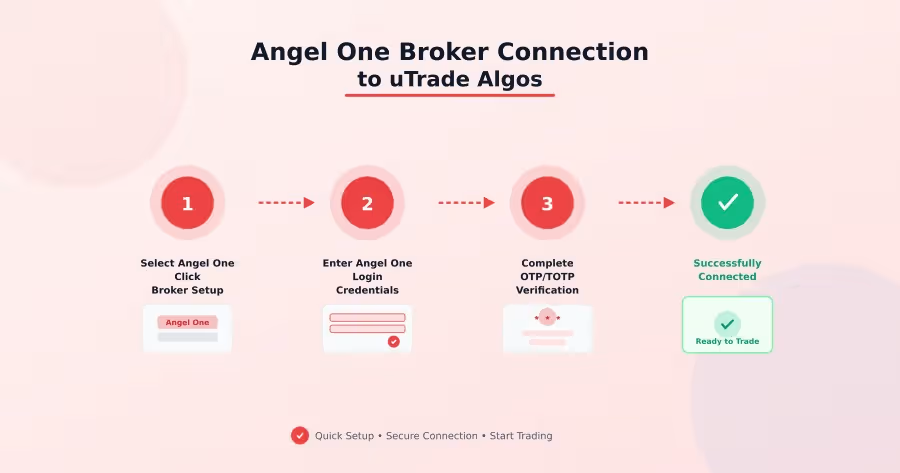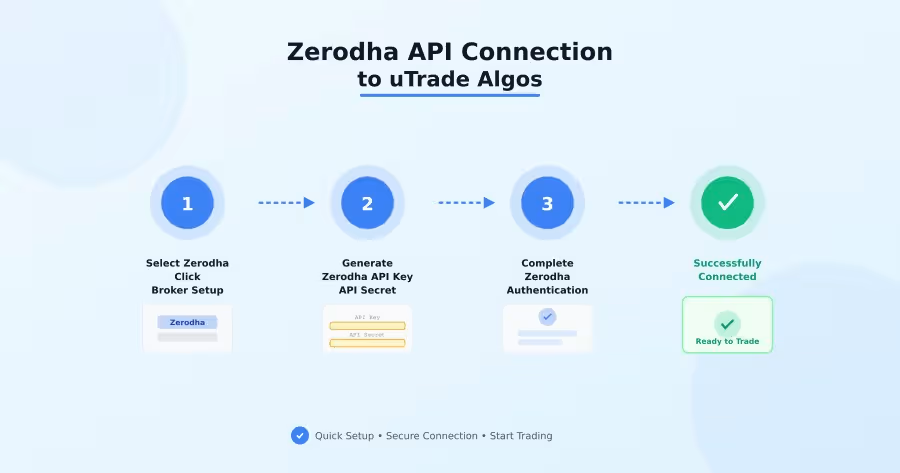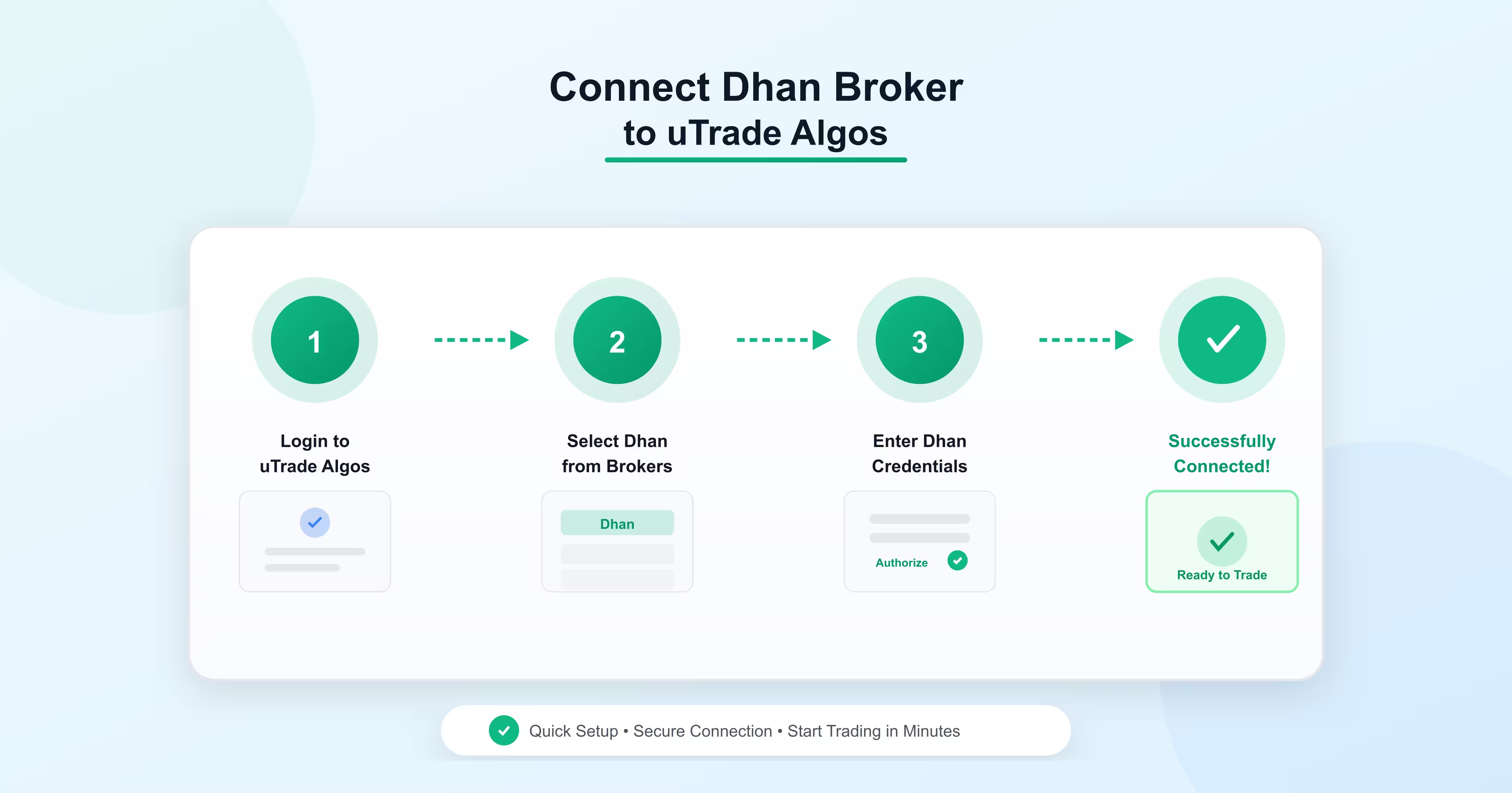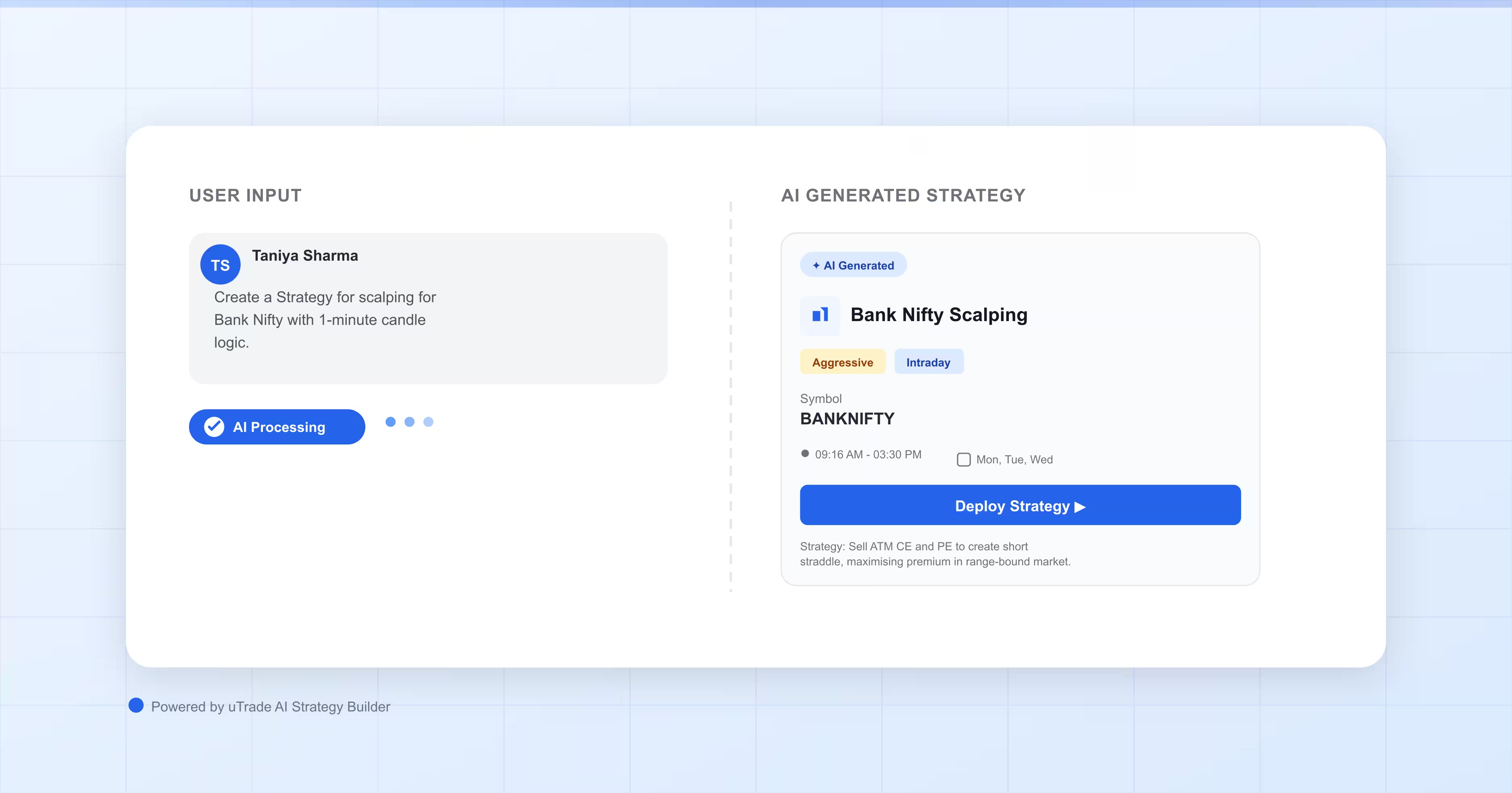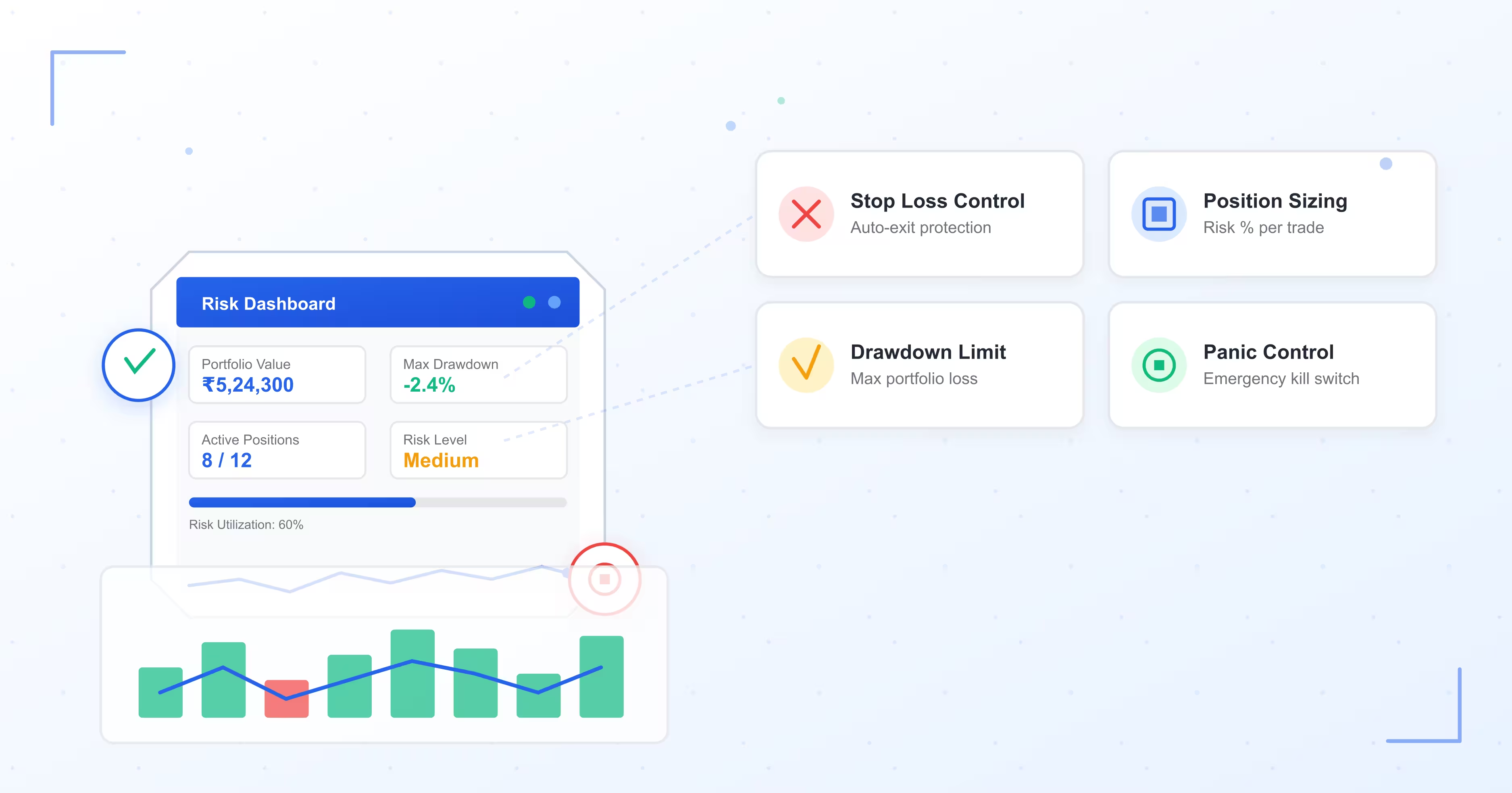An Overview of Algorithmic Trading
Algorithmic trading software offers investors and traders a competitive edge in financial markets by leveraging advanced technology to enhance trading performance, lower operational costs, and improve risk management.
- To engage in algorithmic trading, individuals must open a demat account with a financial institution offering such services and utilise predefined instructions or algorithms for trading decisions.
- By capitalising on stock market opportunities through dedicated algo trading apps, like uTrade Algos, algorithmic trading not only enhances market liquidity but also reduces the influence of emotions in trading decisions.
- Through automated software, algorithmic trading executes trading operations based on pre-defined rules, ensuring swift execution and efficiency in dynamic market conditions.
Insights into Algorithmic Trading Market Trends and Statistics
- In recent years, algorithmic trading has gained substantial traction in India, particularly in emerging markets, owing to its speed and precision.
- North America dominates the algorithmic trading market, followed by Europe. With a projected market size of USD 14.1 billion in 2021, expected to surge to USD 41.9 billion by 2030 at a CAGR of 12.9 per cent, the market's growth is propelled by the rise of high-frequency trading and automation in finance.
- The rapid development of Artificial Intelligence (AI) and Machine Learning (ML) technologies further accelerates this growth.
- The Asia-Pacific region is forecasted to exhibit the highest growth rate in the algorithmic trading market in the coming years.
Advent of Algorithmic Trading in India
In 2008, India witnessed a revolutionary shift in its trading landscape with the introduction of Direct Market Access (DMA) by the Securities and Exchange Board of India (SEBI). DMA empowered institutional clients to execute trades through automated algorithms, marking a pivotal moment in the history of Indian trading.
- By 29 April 2008, global players like UBS, Morgan Stanley, and JP Morgan had embraced DMA, marking a significant milestone in Indian trading history.
- Leading brokerages, including Citi and Goldman Sachs, commenced test runs of their DMA software by 31 July 2008, laying the groundwork for seamless integration with exchange systems.
Since its inception, algorithmic trading programs have evolved exponentially, leveraging sophisticated models to capitalise on market inefficiencies across various segments, including equities, options, and futures. The adoption of algorithmic strategies has surged, with turnover percentages witnessing a remarkable uptrend, particularly in the equities segment of the Bombay Stock Exchange (BSE).
Era of Smart Order Routing
In 2010, SEBI introduced Smart Order Routing (SOR), eliminating the need for investors to navigate between competing exchanges for optimal prices.
- SOR streamlined the trading process, instilling confidence in market participants and bolstering liquidity across exchanges, thereby enhancing overall market efficiency.
- Additionally, the rise of High-Frequency Trading (HFT) introduced lightning-fast trading strategies that capitalise on minute market opportunities within a few seconds, further shaping the evolution of algorithmic trading in India.
Co-Location Services and Accessibility
The introduction of Tick-By-Tick (TBT) data and co-location services by exchanges further propelled the accessibility and efficiency of algorithmic trading software.
- TBT data provides traders with granular, real-time market data, allowing for precise decision-making and execution.
- Co-location services allow traders to physically place their servers within the exchange premises, minimising latency in order transmission and ensuring faster execution.
Retail Participation and Technological Advancements
- Democratised Access: Retail traders now have access to algorithmic trading through user-friendly platforms, like uTrade Algos, and APIs provided by brokers.
- Levelling the Playing Field: Technological advancements enable retail traders to compete on a more equal footing with institutional investors, enhancing market efficiency.
- Innovative Solutions: With access to algorithmic tools and strategies, retail traders can innovate and customise their trading approaches to suit their preferences and risk profiles.
- Empowering Retail Traders: The proliferation of algorithmic trading platforms empowers retail traders to make informed decisions and execute trades with efficiency and precision.
- Customised Strategies: Retail traders can leverage algorithmic tools to develop tailored trading strategies based on their unique trading objectives and market insights.
This democratisation heralds a new era of innovation, empowering retail traders to harness the power of algorithms and craft bespoke trading strategies.
The Path Forward
With over 90 per cent of trades in the US executed via algorithms, India is poised to embrace algorithmic trading wholeheartedly. India aims to align with global standards, reflecting the growing significance of algorithmic trading.
- Dynamic Parameters with AI/ML: Algorithms adapt dynamically to market conditions using AI/ML, suggesting optimal settings based on historical data for improved decision-making.
- Real-Time TCA Integration: Emerging real-time tools analyse Transaction Cost Analysis (TCA) promptly, adjusting trading systems to enhance performance.
- Multi-Asset Utilisation: Algorithms automate trading across different asset classes, diversifying strategies without extra costs.
- Pre-Trade Insights: Algorithms split large orders, optimising trades and minimising fees with backtesting engines, providing valuable performance insights.
- Advanced Automation: Complex rules automate trading processes, accelerating decision-making and enhancing trading proficiency.
The evolution of algorithmic trading in India represents a remarkable journey of innovation, transformation, and growth. From its inception as a groundbreaking trading mechanism to its current status as a cornerstone of modern trading strategies, algorithmic trading has redefined the dynamics of Indian financial markets. As traders continue to leverage advanced technologies and strategies, the future of algorithmic trading programs, like uTrade Algos, holds immense promise, empowering traders to navigate the complexities of financial markets with confidence and agility.


